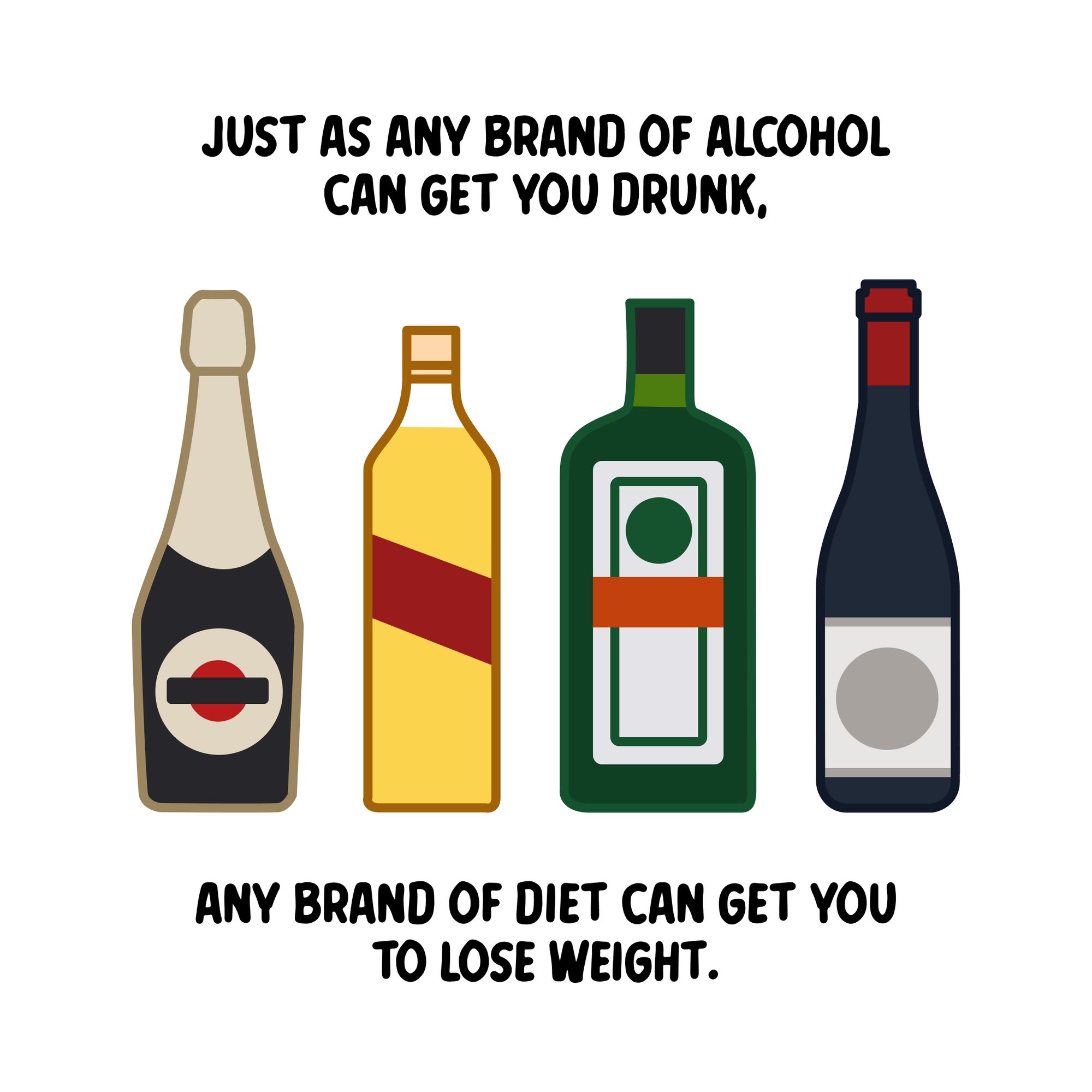Why all diets work until they don't

If you've been around diet culture for a while, you've seen a whole gamut of dietary trends come and go. Every year, there seems to be a new protocol that guarantees rapid weight loss, abundant energy, and lifelong happiness. There was the Slim-Fast shake in the 80s, Atkins' steak and eggs in the 90s, and the "eat-like-a-caveman" Paleo craze through the early 2000s. Recently, we've seen the rise of juice cleanses, keto, intermittent fasting, and the carnivore diet, each with their own fanatical followings.
Here's the thing. I'm not even going to try to convince you that popular fad diets don't work. Because they all work. That's exactly how they became popular in the first place.

All diets work by limiting your energy intake.
Here's the secret that is not-so-secret anymore. Although every diet provides a different recommendation on the surface level ("carbs are bad", "fats are bad", "meat is bad", "legumes are bad", etc), they all work by the same underlying mechanism: giving you a simple way to limit the amount of calories you consume.
Beer, wine, and whiskey all taste different, but they all contain the same active ingredient: alcohol. The ketogenic diet, intermittent fasting, and veganism all look different, but they all contain the same active ingredient: they enable you to eat less food, or choose foods that are less energy dense.

For example, let's take a burger and fries, a classic American meal that is known to pack a ton of calories in a single delicious punch. Someone who is on the keto diet would pass on the fries and bun and perhaps opt for a lettuce wrap instead. Someone who is vegetarian or vegan would forego the meat patty and choose a bean patty that contains considerably less fat and calories. Someone who is on a fasting schedule may eat the whole meal as is, but it would be only one of 2 meals in their day, instead of one out of 3 or 4. At the end of the day, each person eats less on the diet than they would choose to eat otherwise.
Fad diet zealots may make additional claims such as "avoid sugar because it causes insulin spikes and inflammation" or "it's better for your circadian rhythm when you only eat in the hours when the sun is up". While each of these claims may bear a grain of truth, any impact they have on your body weight pales in comparison to the impact of overall caloric restriction. They are hardly reason enough to change your eating habits if that change would otherwise make you miserable.
Diets essentially boil down to simple frameworks for eating less. But in this case, simple is not necessarily sustainable.
Most diets eventually fail, because they sacrifice long term success for short term wins.
You may have come across the oft-cited statistic that 95% of diets fail. Thankfully, this statement has since been debunked by the medical community, since it was drawn from a 1959 study on only 100 individuals. While the reality of weight loss is luckily not so grim, keeping the weight off is a very real challenge for most people.
A more recent meta-analysis of 121 studies and 21,942 participants shows us that people can successfully lose about 10 lbs within a 6 month period, regardless of whether they follow a low carb, low fat, or moderate macronutrient diet. However, the long term outcomes were much less promising. By 12 months, participants who had gone on a weight loss diet had regained most of their weight. On average, they ended up losing only about 2 lbs more than those who didn't diet at all.

This pattern of short-term success followed by long-term weight regain is an unfortunately common experience for many dieters. Physiologically, the body's metabolism adapts to lower calorie intake, making it harder to stick to a diet and maintain a lower body weight as time passes. Psychologically, it becomes progressively harder to deal with the emotional consequences of restrictive eating. The longer they diet, the more dieters feel deprived of the foods they used to enjoy, eventually resulting in episodes of binge eating and weight regain.
Even considering all of that, the number one reason why your diet didn't work out long term is that it wasn't designed specifically for you.
There is no best diet, only the best diet for you.
Food is more than just fuel for our bodies. It also plays a crucial role in shaping our shared culture and social connections. What we eat is a fundamental part of our identity and reflects our heritage and values. It's a way to celebrate our cultural diversity and to honor our family's traditions.
Food brings people together and fosters social connections. Sharing a meal is a universal way to bond with others, whether it's a family gathering, a holiday potluck, or a night out with friends. Food strengthens our relationships by providing a shared experience and a common language.

Food is a notorious source of comfort. A delicious meal can evoke positive emotions and provide a sense of satisfaction and well-being. While emotional eating can be harmful in excess, sometimes we need to allow ourselves to indulge in the simple pleasures of life.
Diets tend to reduce food to a mere source of energy and nutrients, which is an insult to the rich, diverse, and unique role it plays in our lives. To achieve long-term fulfillment, we should appreciate and embrace the cultural, social, and emotional aspects of our individual relationship with food.
The best diet for you is the diet that you can sustain. In practice, this is a diet that includes the foods you naturally enjoy and gravitate toward. It's a diet that thoughtfully considers your taste preferences, your cultural background, your budget, your food environment, your social context, your lifestyle, and more.
Making gradual changes to your nutrition progressively is generally more effective than making drastic changes overnight. Restricting an entire food group can be counterproductive and lead to cravings and overeating. Instead, it's important to practice balance, and to enjoy a variety of foods that nourish your body, mind, and soul. Even indulging in treats like grandma's gooey chocolate brownies can be part of a healthy diet when consumed in moderation.


